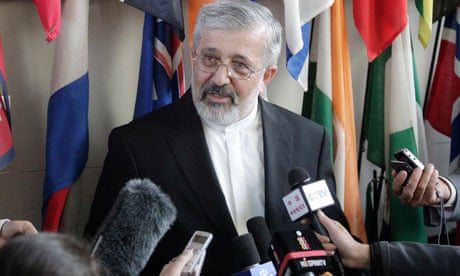Judging by the latest round of negotiations between Iran and the P5+1 in Moscow, neither side seems to be in a hurry to back down and compromise. Instead, both prefer to adopt a wait-and-see approach in the hope that future developments will force the other side to back down.
The P5+1 seems to be counting on the sanctions, especially those scheduled to go into force on 1 July. On that day, the EU will stop its purchases of oil from Iran, meaning Iran will lose 20% of its total export market.
This could lead to further falls in the value of Iran's currency. It could also lead to a major spike in gold and commodity prices (even construction materials) in Iran as they have proven to be a safe haven for those who don't want to see the value of their savings eroded.
The P5+1 is most probably hoping that after the shock of 1 July the Iranian regime will feel weakened and be compelled to compromise. This is a logical possibility. There are also the events in Syria where Assad's regime is turning into a financial and diplomatic pit which Iran is trying to fill with money and military assistance. This is creating a strain on Khamenei's regime, much to the west's advantage.
Meanwhile Khamenei seems to be holding out for an opportunity to create a split in the international community, especially the P5+1 group. For that he has the upcoming US presidential elections this November to look forward to, especially the possibility of a Republican victory.
Iranian dictators love the Republican party. The shah certainly did. According to Professor Abbas Milani's biography, the shah wanted the Republicans to occupy the White House so badly that he made illegal contributions to the Nixon presidential campaign in 1960 and 1968.
The Shah knew that as long as the Republicans were in power they would ignore lack of democracy and human rights, and instead focus on boosting the Shah's military apparatus – in line with his ambitions. Khamenei also prefers the GOP. Its labelling of Iran as part of the "axis of evil", threats of regime change and refusal to hold negotiations with Iran without preconditions put the Russians and the Chinese on Iran's side. It also boosted the regime's standing at home and in the region.
Obama's offer to hold negotiations unconditionally while recognising the regime was a serious effort to reach out to Iran, and this has been terrible for Khamenei. As his chief negotiator saw in Moscow, when it comes to showing a united P5+1 front against Iran at the talks, the Russians and the Chinese are no longer in Iran's camp, because they believe that Obama is interested in a deal and he has tried his best, but Khamenei has not.
That is why P5+1 is rock solid and united in its negotiating position. The Senate and Congress, Democrats and Republicans who usually have little to agree on, are united against Iran as well. So is the EU, despite challenges and differences inside the community.
This is why it would be logical for Khamenei to wait and pray that Obama loses the US election and is replaced with Romney. Romney's threats of war and his unlikely support for talks could drive the Chinese and Russians away from the P5+1 and towards Iran while reducing support for sanctions.
No one knows when the next round of talks between Iran and the P5+1's chief negotiators will be. For now, both sides have agreed to participate in a lower-level technical meeting which is scheduled to for 3 July. After that both sides will decide whether another meeting between the chief negotiators will take place.
From now until the next round both sides will try to use the time to boost their leverage. Until then, Iran's supreme leader would do well to remember that when it comes to negotiations, the perception in the international community is that Obama is far more interested in diplomacy than he.
In politics, perception is extremely powerful in forming opinions. The longer Khamenei waits without showing some kind of overture, the stronger the international public opinion – including that of a number of Muslim countries – against his regime's nuclear programme will become.
It's time Iran's supreme leader realised that the anti-nuclear Iran camp is far wider than western countries. As the P5+1's unity shows, it has reached Moscow and Beijing. Instead of playing the victim, Khamenei should ask himself why.
